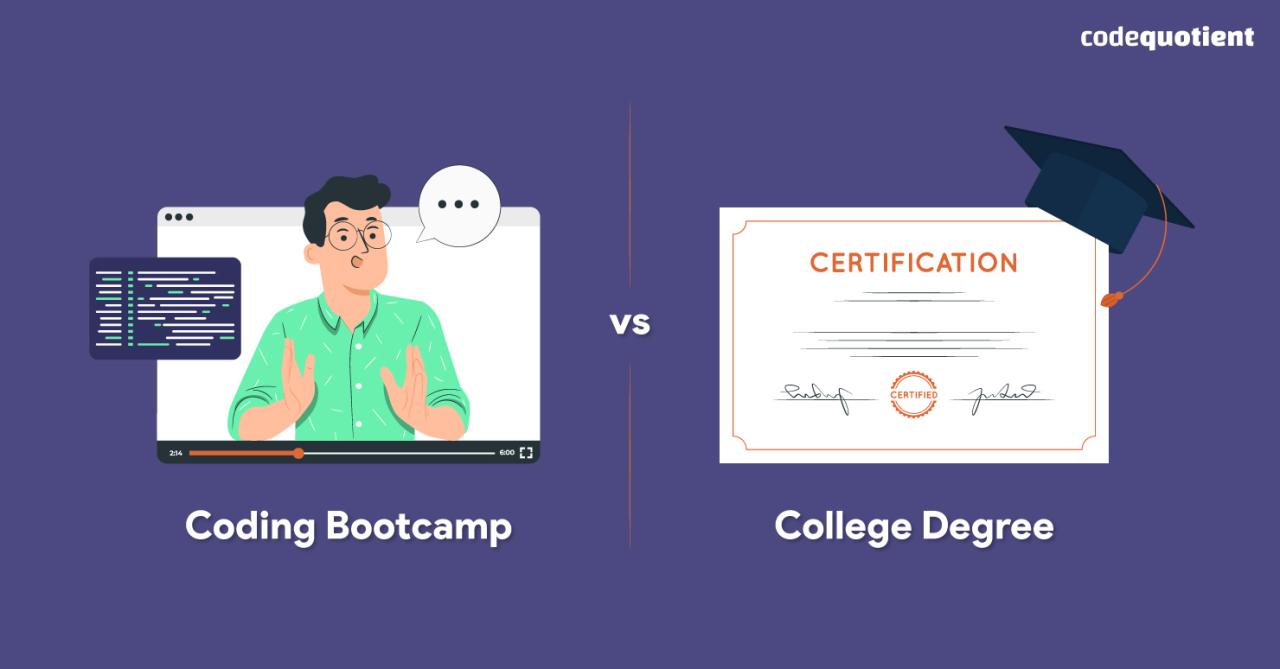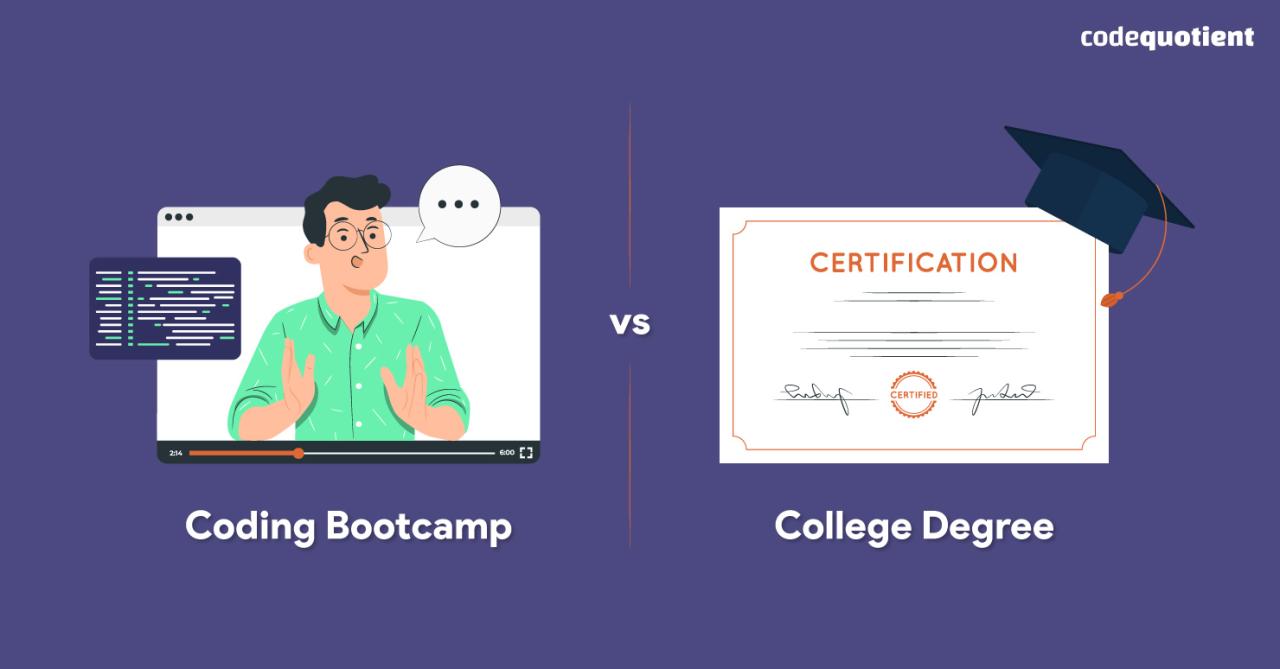Cost Comparison

Choosing between a coding bootcamp and a computer science degree involves a significant financial commitment. Understanding the total cost of each option, including tuition, fees, living expenses, and the opportunity cost of lost income, is crucial for making an informed decision. This section will compare these costs and analyze the potential return on investment (ROI) for each path.
Cost Breakdown: Bootcamp vs. Degree
The financial differences between bootcamps and degrees are substantial. Bootcamps generally represent a significantly lower upfront investment, but this comes with trade-offs in terms of breadth and depth of education. Conversely, computer science degrees are a much longer-term commitment with higher overall costs. The following table provides a general comparison, acknowledging that costs vary widely depending on location, institution, and program specifics. These figures are estimates and should be verified with specific programs.
| Bootcamp Tuition | Bootcamp Fees | Degree Tuition | Degree Fees |
|---|---|---|---|
| $10,000 – $20,000 | $500 – $2,000 | $40,000 – $100,000 | $1,000 – $5,000 per year |
Return on Investment (ROI)
The ROI of a coding bootcamp or a computer science degree depends heavily on factors such as starting salary, career progression, and the length of time it takes to secure employment. While a degree often leads to higher earning potential in the long run, the shorter duration and lower upfront cost of a bootcamp can result in a faster ROI.
- Bootcamp ROI: A typical bootcamp graduate might secure a junior developer role earning $60,000-$80,000 annually within a few months of graduation. Considering the relatively low cost of the program, the investment could be recouped within a year or two. However, career progression might be slower compared to degree holders, potentially limiting long-term earning potential.
- Degree ROI: A computer science graduate might initially earn less than a bootcamp graduate, perhaps starting at $65,000-$75,000. However, a degree opens doors to higher-paying roles and faster career advancement over the long term. The initial investment is higher, but the potential for significantly increased earnings over a 30-year career can yield a substantial ROI, potentially exceeding that of a bootcamp graduate over their lifetime earnings.
Note: These are estimates and actual results will vary significantly based on individual skills, job market conditions, and career choices. The figures provided are intended for illustrative purposes only.
Curriculum Differences: Is Coding Bootcamp Better Than A Degree

Coding bootcamps and computer science degree programs offer distinct educational pathways to a career in software development. While both aim to equip students with programming skills, their approaches, depth of coverage, and overall focus differ significantly. This section will delve into these key curriculum differences, highlighting the strengths and weaknesses of each approach.
Is coding bootcamp better than a degree – A primary difference lies in the breadth and depth of the curriculum. Bootcamps generally focus on practical, job-ready skills within a shorter timeframe, while computer science degrees provide a broader theoretical foundation and a deeper exploration of various computer science concepts.
Curriculum Comparison
The following table compares and contrasts the curricula of a typical coding bootcamp and a computer science degree program. Note that the specific topics and depth of coverage can vary significantly depending on the institution and program.
| Bootcamp Topic | Bootcamp Depth | Degree Topic | Degree Depth |
|---|---|---|---|
| Web Development Fundamentals (HTML, CSS, JavaScript) | Practical application, building basic websites and web apps | Web Development (including front-end, back-end, databases) | In-depth study of web technologies, design patterns, security, and scalability; potentially includes multiple specialized courses. |
| Specific Programming Language (e.g., Python, JavaScript, Java) | Focus on practical coding skills and common libraries/frameworks relevant to industry demand. | Multiple Programming Paradigms (e.g., object-oriented, functional, procedural) and Languages (e.g., C++, Java, Python) | Theoretical understanding of programming languages, design principles, algorithm analysis, and data structures. Focus on problem-solving and efficient code writing. |
| Framework/Library (e.g., React, Node.js, Spring) | Hands-on experience building applications using popular frameworks | Software Engineering Principles (Design patterns, testing, version control) | Comprehensive study of software development lifecycle, including design, implementation, testing, deployment, and maintenance. Advanced topics such as distributed systems and concurrency. |
| Database Management (SQL, NoSQL) | Basic database interactions and querying | Database Systems (Relational and NoSQL databases, database design, query optimization) | In-depth understanding of database theory, design, implementation, and management. Advanced topics like transaction management and database security. |
| Agile Development Methodologies | Introduction to Agile principles and practices | Software Engineering Processes (Agile, Waterfall, DevOps) | Detailed study of various software development methodologies and their application in different contexts. |
Skill Translation to Industry Demands
Both bootcamps and computer science degrees aim to prepare students for industry roles, but the skills emphasized differ. Bootcamps prioritize immediate practical application, focusing on skills highly sought after in entry-level positions. For example, a bootcamp graduate might be proficient in building web applications using React and Node.js, deploying them to cloud platforms like AWS or Google Cloud, and working with SQL databases. This immediately applicable skillset makes them attractive candidates for junior developer roles.
Computer science degrees, on the other hand, provide a broader skillset, including a deeper understanding of algorithms, data structures, and software engineering principles. This deeper theoretical knowledge allows graduates to tackle more complex problems and adapt to evolving technologies more readily. While they may not possess the same level of immediate proficiency in specific frameworks as bootcamp graduates, their strong foundation allows them to quickly learn and master new technologies as needed. For example, a computer science graduate might have a stronger understanding of how to design and implement efficient algorithms, making them suitable for roles requiring more complex problem-solving and system design.
Theoretical versus Practical Focus
The primary difference in the two educational paths lies in their emphasis on theoretical versus practical knowledge. Bootcamps prioritize practical skills, offering intensive hands-on training to build a portfolio of projects and quickly prepare students for entry-level roles. The curriculum is often highly focused, prioritizing the most in-demand technologies and frameworks. This approach allows students to quickly acquire job-ready skills, but may lack the depth of theoretical understanding needed for more advanced roles or to adapt to rapidly changing technological landscapes.
Computer science degrees, conversely, emphasize a strong theoretical foundation. Students spend considerable time studying fundamental concepts like algorithms, data structures, computer architecture, and operating systems. This provides a robust base for future learning and adaptation to new technologies. While this approach might not immediately translate into job-ready skills in specific frameworks, it equips graduates with the problem-solving skills and theoretical understanding needed to excel in advanced roles and adapt to emerging technologies.
Time Commitment

Choosing between a coding bootcamp and a computer science degree involves a significant consideration of time investment. The drastically different durations impact not only career progression but also personal life choices. Understanding these differences is crucial for making an informed decision.
The most immediate difference lies in the sheer length of each program. Bootcamps are designed for rapid skill acquisition, while degrees offer a more comprehensive and in-depth educational experience.
Program Durations
The following table summarizes the typical duration of each program type:
| Program Type | Duration |
|---|---|
| Coding Bootcamp | 3-6 months (intensive programs); 9-12 months (part-time or more comprehensive programs) |
| Computer Science Degree | 4 years (Bachelor’s degree) |
Impact on Career Progression
The shorter duration of a bootcamp allows for quicker entry into the job market. Graduates can start building professional experience and earning a salary sooner. However, a computer science degree often provides a broader foundation of knowledge, potentially leading to higher earning potential and more advanced career opportunities in the long run. For instance, a bootcamp graduate might find immediate employment as a junior developer, while a degree holder might be better positioned for roles requiring more theoretical understanding or project management responsibilities.
Impact on Personal Life
The intensive nature of bootcamps requires significant personal sacrifices. Students often dedicate long hours to coursework and projects, limiting time for other commitments. A four-year degree, while demanding, generally allows for a more balanced lifestyle, with more flexibility to pursue personal interests and social activities alongside studies.
Hypothetical Career Timeline, Is coding bootcamp better than a degree
Let’s consider two hypothetical individuals, Alex and Ben. Alex completes a 3-month coding bootcamp, while Ben completes a 4-year computer science degree.
Alex (Bootcamp Graduate):
* Month 0-3: Intensive bootcamp training.
* Month 3-6: Job search and securing a junior developer position.
* Year 1-3: Gains practical experience, builds portfolio, potentially seeks promotion.
* Year 3-5: Explores specialization or considers further education (potentially a Master’s degree).
Ben (Computer Science Degree Graduate):
* Year 0-4: Undergraduates studies in Computer Science. May include internships during summer breaks.
* Year 4-5: Job search and securing a position (potentially a more senior role due to broader knowledge).
* Year 5-7: Gains experience, builds portfolio, potentially takes on more responsibility.
* Year 7-10: Explores specialization, leadership roles, or advanced studies (Masters or PhD).
This hypothetical timeline illustrates the faster initial career entry for bootcamp graduates, but also highlights the longer-term potential for those with a degree. The optimal path depends on individual circumstances, career goals, and risk tolerance.


Tim Redaksi